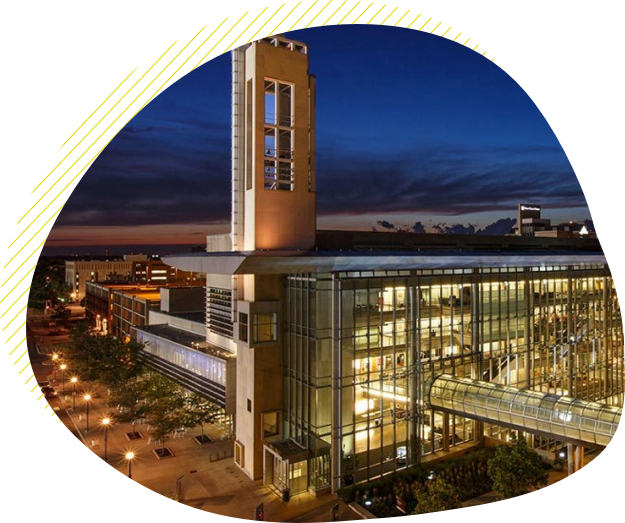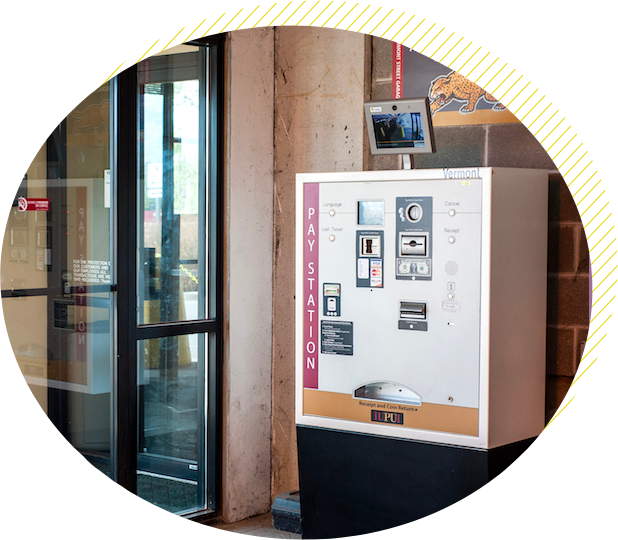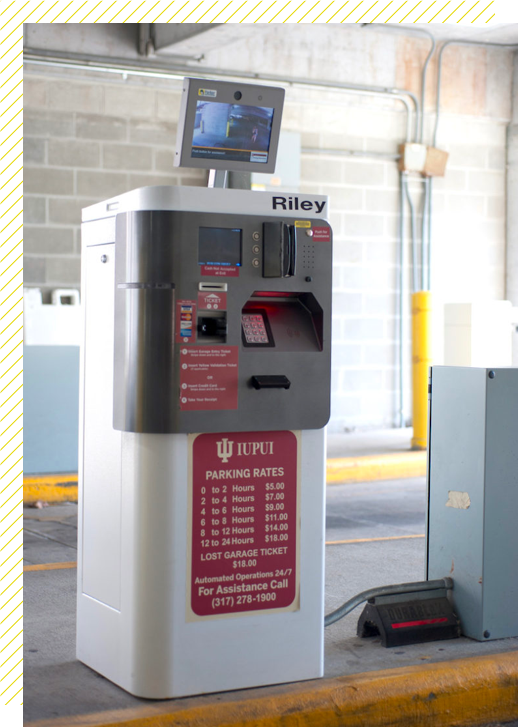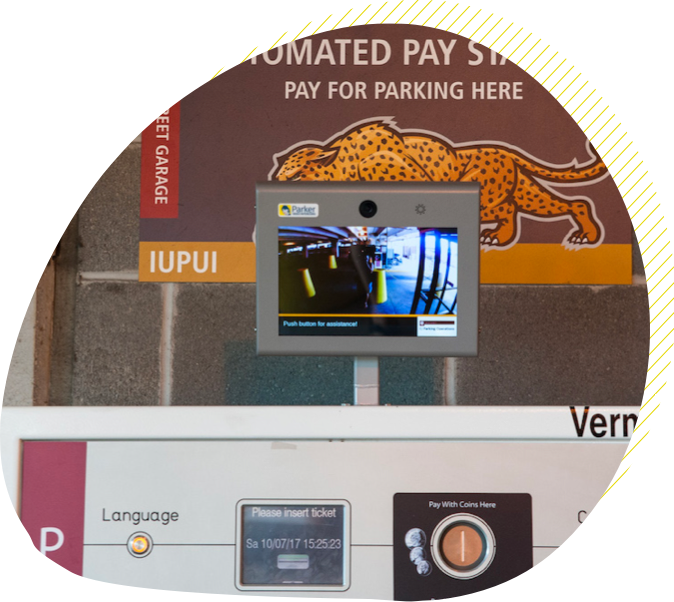
Growing Demands on Urban Campus
IUPUI is one of Indiana University’s main campuses, and is Indiana’s premier urban public research university. Its recent enrollment totals more than 27,000. IUPUI has 2 colleges and 18 schools which grant degrees in more than 350 programs from both Indiana University and Purdue University. It is home to the second largest School of Medicine in the country, one of the oldest dental schools in the nation, the Kelley School of Business, the world’s first school of Philanthropy, the Lilly Family School of Philanthropy, the Herron School of Art and Design, the only professional school of art and design in Indiana, the IU Natatorium, among many others.
Therefore, Parking and Transportation Services team face significant demands each day. As the campus moved to automated technology, the 24/7 operational requirements put considerable strain on the staff. The chancellor’s new initiative added additional pressure to find a long-term solution.
Automation and Manpower Problems
“We underestimated the resources needed to continue providing high levels of service after automation, and we weren’t prepared for the impact it had on our business,” said Sheri Eggleton, Director of Parking and Transportation Services. Many of their customers are not tech savvy, which compounded technical issues with user error.
At the time of the initiative’s launch, parking patrons pressing the help button would ring into a single-line master control station. This terminal forwarded the call to a single-line cellular phone manned by an on-call attendant, who would then offer help.
The system frequently crashed, leaving customers sometimes stranded in the parking garage with no way out. The constant need to repair the system was a considerable drain on parking staff and university IT resources.

Confidence Drops When You Have a Broken System
“The system could go down and we wouldn’t even know it,” said Laurie Bickell, Associate Director of Parking and Transportation Services. “We could test it (successfully), then it would go down, and we wouldn’t become aware until we received complaints that someone was calling and calling and getting no response.”
In addition, staffing problems plagued an ‘after hours’ call center that Parking and Transportation Services contracted to provide additional coverage. Call center employees were not qualified to assist, and at best were only able to dispatch a local attendant; a process that often took 5 to 10 minutes or more. This led to increased customer dissatisfaction and ultimately lost revenue.
“It made no sense for people to wait that long for staff to come help them, when someone qualified, with the right technology, should be able to solve the issue in 30 seconds.”

Laurie Bickell
These breakdowns became increasingly embarrassing when complaints were escalated to upper levels in the administration.
“We were finding that VIPs and even donors were getting stuck in the garage and falling prey to these technology glitches and gaffes,” Eggleton said. “We were losing credibility (within the administration). Parking services creates a first impression in our university, and continual problems reflected poorly on IUPUI.”

Parker Technology’s two-way video intercoms were installed on existing T2 Systems equipment.
Finding a New Direction
Parking and Transportation Services leadership knew they needed a new “help” system, but most of the industry-standard services were audio-only and failed to address their two problems 1) quality of the interaction and 2) quick and responsive support without a long wait. Unwilling to invest in a system that would only be affected by the same problems as the existing one, they set out to find something completely different.
It was the discovery of Parker Technology that solved both dilemmas. The face-to-face video intercoms added empathy and a professional interaction to each call, giving IUPUI an immediate impact on the guest experience. And better yet, by leveraging Parker Technology’s customer service solution, the university gained a professionally trained, parking-focused team that could handle parking patron requests for help, significantly reduce wait times and eliminate most dispatches of an onsite attendant.
The parking team was one step closer to fulfilling Chancellor Paydar’s welcome challenge.
Convincing Stakeholders on New Technology
There were no comparable companies providing services similar to Parker Technology. Thus, IUPUI’s Parking and Transportation Services did not have to create an RFP for their proposal. They did, however, need to convince their parking services peers at other Indiana University campuses to buy into the idea. IUPUI is part of Indiana University, with campuses across the State of Indiana, all of whom have a stake in what tools and technology are rolled out across the University system.
They encountered little resistance. A “live” demo from Parker Technology representatives showed the platform in action. A participant pressed the “help” button and the moment the group saw a Parker Technology Customer Service Representative answer the call, and say “Thank you for parking with Indiana University, how may I help you?” they understood why putting the human touch in parking was a game changer. Other items on the wish list could be addressed too, including real-time monitoring of system performance and uptime, the capability to record interactions for quality assurance, and access to a complete reporting suite for dynamic analytics.
“Thank you for parking with Indiana University, how may I help you?”
The administration, eager to address existing customer service issues, completed their due diligence and agreed to the system. “It was very easy to get the buy-in because it’s just so intuitive,” Bickell said. “Parker Technology gives you all the analytics, and immediately you can see how it will improve your customer experience.”
Smooth Implementation
With an in-house installation staff, IUPUI Parking and Transportation Services handled installation themselves and found few roadblocks.
The install went smoothly, with materials readily available and delivered quickly. Parking Systems Manager Doug Manning said it was “probably the easiest implementation I’ve actually done as far as the hardware goes.”
Manning oversaw the delicate maneuvers of maintaining the old intercom system even as the new one was being installed and brought online. Working closely with the university IT department, they created a new V-LAN for each garage and added new IP addresses that would be compatible with the Parker Call Center Software cloud. “It was pretty smooth,” Manning said. “We have a good working relationship with our networking team. The biggest challenge was the timing, because of the way the university does its networking.”

The Results Speak for Themselves
The results have been uniformly, overwhelmingly positive. Customer complaints have dropped dramatically, wait times drastically lowered, and call volume increased exponentially. Before the change to Parker, the garage’s call volume was at 50-60 calls per day; after Parker went online, daily call volume leapt to around 300 per day. This highlights both the shortcomings of the old system, and the ability of Parker Technology’s systems to handle volume.
“Parking is the first and last experience that creates an impression for our university. Parker Technology fits right in with that vision.”

Sheri Eggleton, IUPUI
Bickell touted the ease of use and the reassurance that comes from face-to-face interaction with raising customer service rates. “It’s knowing when you hit that button that someone will be there that can help,” she said. “I was watching someone use the system a few days ago, and the surprise on their face when they got prompt help was great. The whole thing lasted maybe 15 seconds, but it creates a lasting impression.”
Eggleton found the system has also eased administrative scrutiny on parking services, and aligns with the chancellor’s initiative to be a “welcoming” place for visitors of all types. “Parking is the first and last experience that creates an impression of our university. Parker Technology fits right in with that vision.”
